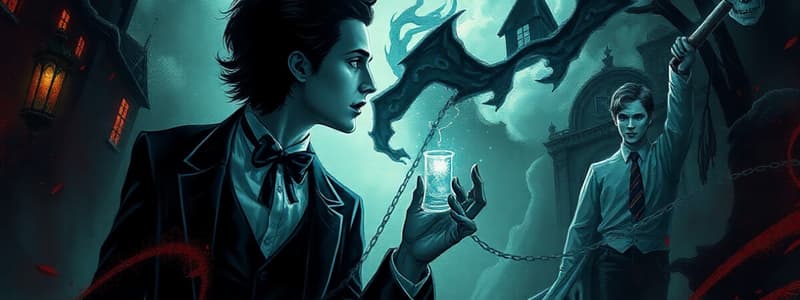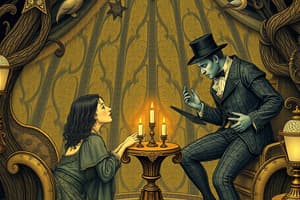Podcast
Questions and Answers
Henry Jekyll instructed his colleague to admit a man into his house at noon.
Henry Jekyll instructed his colleague to admit a man into his house at noon.
False (B)
The contents of the drawer taken from Jekyll's cabinet included a blood-red liquor.
The contents of the drawer taken from Jekyll's cabinet included a blood-red liquor.
True (A)
Dr. Jekyll expressed confidence that his request would not be trifled with.
Dr. Jekyll expressed confidence that his request would not be trifled with.
True (A)
The man who arrived at Jekyll's house was known to the narrator prior to this event.
The man who arrived at Jekyll's house was known to the narrator prior to this event.
The series of dates in Jekyll's notebook ceased approximately two years before the events described.
The series of dates in Jekyll's notebook ceased approximately two years before the events described.
The visitor displayed impatience when discussing a matter of importance with Dr. Lanyon.
The visitor displayed impatience when discussing a matter of importance with Dr. Lanyon.
Dr. Lanyon felt a sense of joy upon seeing the visitor's strange clothing.
Dr. Lanyon felt a sense of joy upon seeing the visitor's strange clothing.
The mixture that the visitor prepared changed from a reddish hue to a dark purple and then to a watery green.
The mixture that the visitor prepared changed from a reddish hue to a dark purple and then to a watery green.
The visitor offered Dr. Lanyon a choice that would enrich him both financially and intellectually.
The visitor offered Dr. Lanyon a choice that would enrich him both financially and intellectually.
Dr. Lanyon was completely composed when the visitor drank from the glass.
Dr. Lanyon was completely composed when the visitor drank from the glass.
Henry Jekyll requested Lanyon to delay all other engagements for an important matter.
Henry Jekyll requested Lanyon to delay all other engagements for an important matter.
Lanyon had been in constant correspondence with Jekyll prior to receiving the registered letter.
Lanyon had been in constant correspondence with Jekyll prior to receiving the registered letter.
The letter from Jekyll to Lanyon mentioned specific items to retrieve from the drawer.
The letter from Jekyll to Lanyon mentioned specific items to retrieve from the drawer.
Jekyll expressed a desire for Lanyon to break into his cabinet at any time of day.
Jekyll expressed a desire for Lanyon to break into his cabinet at any time of day.
The letter was dated 10th January.
The letter was dated 10th January.
Flashcards
Morbid fear
Morbid fear
A strong fear or worry that something bad will happen.
Extreme distress of wind
Extreme distress of wind
A sudden and strong feeling of anxiety.
Glazed Press
Glazed Press
A locked cabinet containing important items that need to be accessed quickly.
My life, my honour, my reason, are all at your mercy
My life, my honour, my reason, are all at your mercy
Signup and view all the flashcards
Postpone all other engagements
Postpone all other engagements
Signup and view all the flashcards
Disgustful Curiosity
Disgustful Curiosity
Signup and view all the flashcards
The Protagonist's Initial Impression of Mr. Hyde
The Protagonist's Initial Impression of Mr. Hyde
Signup and view all the flashcards
Mr. Hyde's Odd Appearance
Mr. Hyde's Odd Appearance
Signup and view all the flashcards
The Protagonist's Decision to Help
The Protagonist's Decision to Help
Signup and view all the flashcards
The Transformation of The Potion
The Transformation of The Potion
Signup and view all the flashcards
Jekyll's Letter to Lanyon
Jekyll's Letter to Lanyon
Signup and view all the flashcards
Lanyon's response to Jekyll's request
Lanyon's response to Jekyll's request
Signup and view all the flashcards
What Lanyon retrieves from Jekyll's cabinet
What Lanyon retrieves from Jekyll's cabinet
Signup and view all the flashcards
Lanyon's physical response to the visitor
Lanyon's physical response to the visitor
Signup and view all the flashcards
Description of the visitor
Description of the visitor
Signup and view all the flashcards
Study Notes
Letter from Henry Jekyll to Utterson
- Jekyll writes to his friend Lanyon, detailing a critical situation, urgently requesting his assistance.
- Jekyll describes an urgent need to retrieve a drawer from his cabinet containing crucial experimental materials (powders, a phial, and a notebook).
- He requires Lanyon to open the door at midnight to a specific person coming on his behalf.
- The failure of one step could jeopardize his life and reason.
- Jekyll expresses great distress and the threat of loss of self-control if his request is not carried out.
- He also includes a postscript detailing potential delays caused by his concern that the letter may be delayed.
Lanyon's Account of Jekyll's Case
- Lanyon receives the letter and, despite initial skepticism, fulfills Jekyll's demands.
- Lanyon describes the retrieved items: powders (likely chemically compounded by Jekyll), a blood-red liquid (potentially containing phosphorus and volatile ether), and a notebook documenting a series of experiments.
- The experiments have stopped significantly in their chronological sequence, approximately a year ago, along with brief notes, including "double" appearing repeatedly within the entries.
- Lanyon's observations suggest Jekyll's mental instability, but he feels a professional obligation to comply.
Jekyll's Full Statement
- Jekyll details his descent into duality.
- Jekyll meticulously lays out the scientific process and rationalization for his drug-induced transformations from Jekyll to Hyde.
- Jekyll describes the effects of the drug, both physically and mentally, with a clear dichotomy between his "good" and "evil" selves.
- Jekyll explains the development of his "evil" self (Mr. Hyde).
- Jekyll describes his attempts to control his transformations and his increasing dread of the consequences.
- Jekyll describes his moral failures and the growing power of Hyde, ultimately leading to the murder of Sir Carew.
- Jekyll ends his confession with his final descent into becoming Hyde, detailing the fear and horror that accompanies the transformation.
Hyde's Actions and Motivation
- Hyde's actions are described as monstrous and self-serving.
- Hyde's actions reveal a desire for the pursuit of evil as a means to satisfy base urges.
- Hyde expresses indifference towards Jekyll at all times in their interactions.
- Lanyon witnesses the transformation of Jekyll to Hyde and back.
- Lanyon’s description of Jekyll and Hyde emphasizes their distinct physical and psychological characteristics.
Studying That Suits You
Use AI to generate personalized quizzes and flashcards to suit your learning preferences.




